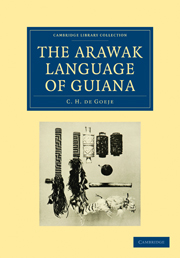Book contents
- Frontmatter
- Preface
- Contents
- List of literature
- Rules for pronunciation and abbreviations
- Alphabetical Index
- German words in Schultz' texts
- CHAPTER I Finite verb
- CHAPTER II Character of the Arawak words
- CHAPTER III Infinite verb
- CHAPTER IV Auxiliary verb a
- CHAPTER V Intensives, conjunctions, etc.
- CHAPTER VI K; B
- CHAPTER VII F; P; B
- CHAPTER VIII M
- CHAPTER IX N
- CHAPTER X D
- CHAPTER XI T
- CHAPTER XII Formation of verbs, etc.
- CHAPTER XIII L; R
- CHAPTER XIV H
- CHAPTER XV S
- CHAPTER XVI Vowels, diphotongs; colours
- CHAPTER XVII Classes of utterances; numerals
- CHAPTER XVIII Man
- CHAPTER XIX Foreign words. Arawak and Arawak-Maipure
- CHAPTER XX Origins of the Arawak language
- APPENDIX: Information collected in Surinam in 1907 and in 1928
- Frontmatter
- Preface
- Contents
- List of literature
- Rules for pronunciation and abbreviations
- Alphabetical Index
- German words in Schultz' texts
- CHAPTER I Finite verb
- CHAPTER II Character of the Arawak words
- CHAPTER III Infinite verb
- CHAPTER IV Auxiliary verb a
- CHAPTER V Intensives, conjunctions, etc.
- CHAPTER VI K; B
- CHAPTER VII F; P; B
- CHAPTER VIII M
- CHAPTER IX N
- CHAPTER X D
- CHAPTER XI T
- CHAPTER XII Formation of verbs, etc.
- CHAPTER XIII L; R
- CHAPTER XIV H
- CHAPTER XV S
- CHAPTER XVI Vowels, diphotongs; colours
- CHAPTER XVII Classes of utterances; numerals
- CHAPTER XVIII Man
- CHAPTER XIX Foreign words. Arawak and Arawak-Maipure
- CHAPTER XX Origins of the Arawak language
- APPENDIX: Information collected in Surinam in 1907 and in 1928
Summary
The t, in the meaning of “moving towards an object” (with a touch of will-power in it), we have already met with when we considered the construction of the action-words (§ 1). It occurs in a similar meaning in the particle te (§ 95), and in a great many words, for which we refer the reader to the Alphabetical Index, especially under T.
In some words and particles ti alternates with ci (phonetically tsyi). It is possible that ti is especially used if it is necessary to make the t principle appear plainly, or if the t principle is strongly felt, and tsyi etc. where that is not the case. Probably also euphony plays an important part in this phenomenon, e.g. t-isi (ph. t-isyi), its seed, t-isa (ph. t-isa). her child. c-ikisi (ph. tsy-ikisyi), (its) moment, c-iwi (ph. tsy-iwi), (its) fruit.
T in the meaning of “being active”, “asserting oneself”, in the verbal nouns ending in -ci (f. -tu).
T in the meaning of d, see §§ 44 f), 45 f), 47, 179 c). and with a similar meaning in the following:
a) 1) tata-ni ho-loa o-doma, for the hardness of your heart, Daii tata-ci, I was an austere man, ma-tata-tu ialoko, a spirit of infirmity, tata kiana t-adeki-n l-ibici, and (she) earnestly looked upon him, to-moroa tata sabu goba l-ajia-n, but he spake the more vehemently, aba tata-tu-wabu auaduli.
- Type
- Chapter
- Information
- The Arawak Language of Guiana , pp. 129 - 130Publisher: Cambridge University PressPrint publication year: 2009First published in: 1928



